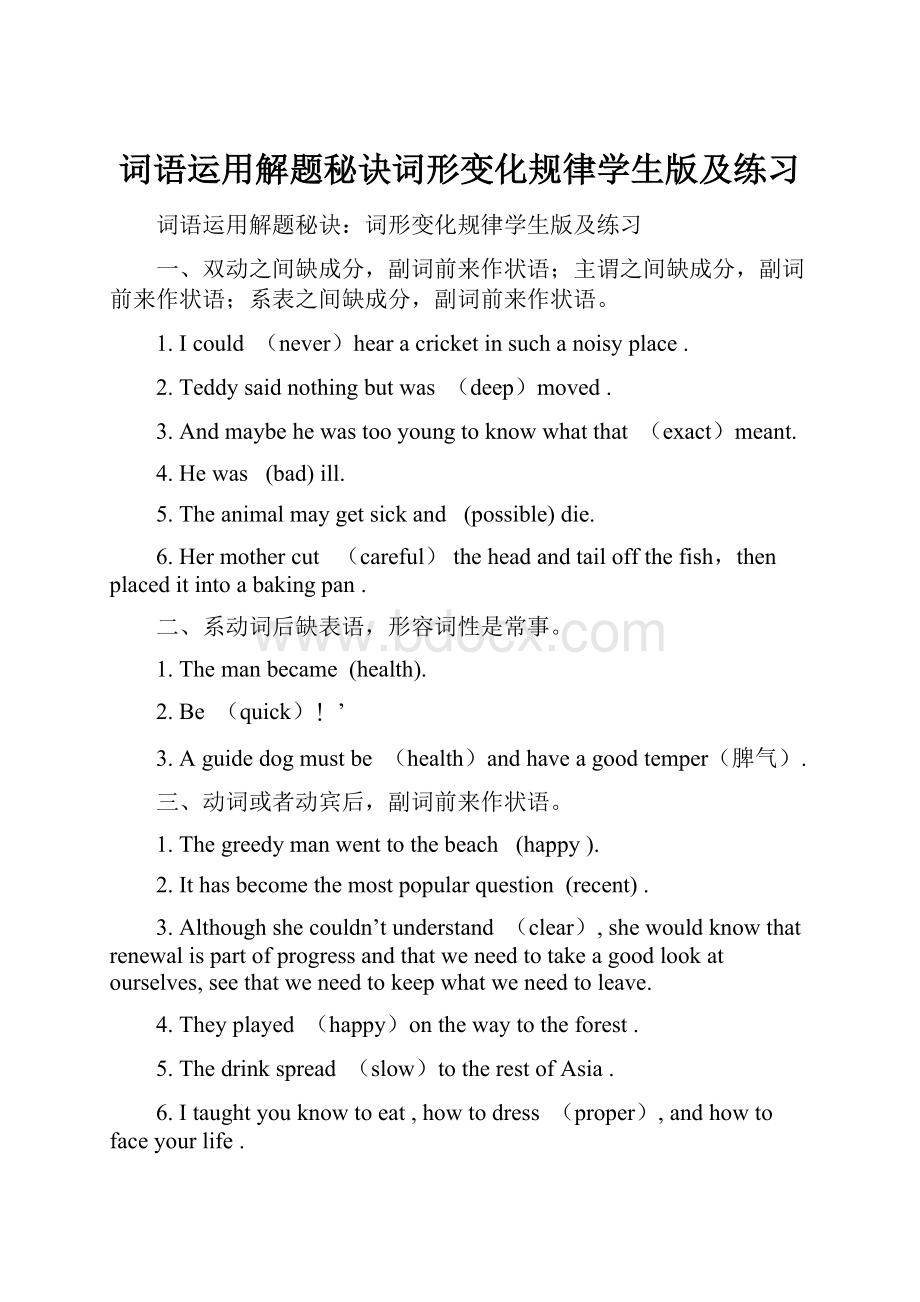词语运用解题秘诀词形变化规律学生版及练习.docx
《词语运用解题秘诀词形变化规律学生版及练习.docx》由会员分享,可在线阅读,更多相关《词语运用解题秘诀词形变化规律学生版及练习.docx(24页珍藏版)》请在冰豆网上搜索。

词语运用解题秘诀词形变化规律学生版及练习
词语运用解题秘诀:
词形变化规律学生版及练习
一、双动之间缺成分,副词前来作状语;主谓之间缺成分,副词前来作状语;系表之间缺成分,副词前来作状语。
1.Icould(never)hearacricketinsuchanoisyplace.
2.Teddysaidnothingbutwas(deep)moved.
3.Andmaybehewastooyoungtoknowwhatthat(exact)meant.
4.Hewas(bad)ill.
5.Theanimalmaygetsickand(possible)die.
6.Hermothercut(careful)theheadandtailoffthefish,thenplaceditintoabakingpan.
二、系动词后缺表语,形容词性是常事。
1.Themanbecame(health).
2.Be(quick)﹗’
3.Aguidedogmustbe(health)andhaveagoodtemper(脾气).
三、动词或者动宾后,副词前来作状语。
1.Thegreedymanwenttothebeach(happy).
2.Ithasbecomethemostpopularquestion(recent).
3.Althoughshecouldn’tunderstand(clear),shewouldknowthatrenewalispartofprogressandthatweneedtotakeagoodlookatourselves,seethatweneedtokeepwhatweneedtoleave.
4.Theyplayed(happy)onthewaytotheforest.
5.Thedrinkspread(slow)totherestofAsia.
6.Itaughtyouknowtoeat,howtodress(proper),andhowtofaceyourlife.
7.Inthiswayyoucannotonlyrefuse(polite)butmakethepersonwhoinvitedyoufeelcomfortable.
8.Thankstotheclearweatherheandhisteamclimbed(quick)tothetop.
四、疑问代词what/who,它们作主(语)谓(语)单三
1.What(make)dogsbecomeguidedogs?
2.What(matter)tomeistobewithyou?
3.What(be)wrongwithyou?
4.Who(be)notheretoday?
五、助动(do、does、did、will)情动跟动原。
1.Youdon’treally(know)ifit’strueornot.
2.Itcanalso(pollute)theair.
3.Justwalkstraightandpleasedon’t(turn)back.
4.Ifyoudothat,you’ll(waste)yourlifetime.
5.Thenwecan(store)themasmemoriesinourdeephearts.
6.Oneofthefirstcoffeehouseownerswhoofferedteasolditat6to10perpound,apriceonlytheveryrichcould(afford).
六、动词作主语,动词添上ing。
1.(work)atazooisaverypopularjob.
2.(smoke)isharmfultoyourhealth,shouldgiveitup.
3.(burn)gas,oilandcoalcreatesairpollution.
七、动词作定语,后边常加ing
My(bake)panwastoosmalltofitinthewholefish.
八、be动后边跟行动,现分、过分居其一。
1.Areyou(produce)thefreshairthatcanmakeyoucomfortable?
2.The2014Sochi(索契)WinterOlympicstorch(火炬)was(send)totheInternationalSpaceonaRussianspaceshiplastweekandastronautscarrieditoutsidethestation.
3.Oneday,afatherandhissonwere(take)awalknearabeautifulgarden.
4.Friendshipwillbreakquicklyifonlyonepersonisgivingand(put)effortintoit.
5.OverthetopofthepaperIwas(read)cameaterriblethingthatcausedmetojump.
6.Whenyouare(invite)toapartyorsomeothereventsthatyoudonotwanttotakepartin.
7.Whentheyaretwomonthsold,theywouldbe(send)tothetrainingcenter.
8.Dinnerwasnot(eat)untillateintheevening.
9.ThesouthernpartofSochicouldbe(see)inthebackground.
九、have、has与had,过分跟后完成时。
1.Ihadn’t(pick)anyupbecauseyoutoldmenotturnback.
2.YouwillrealizethatIalwaystrymybesttogiveyouthebestinspiteofthemanymistakesIhave(make).
十、动、介后边跟代词,宾格作宾常留意。
1.Whynotwash(they)inanenergy–savingway.
2.Thoughthesearesimpletasks,themonkeyshavetohaveabout18to24month’strainingtobeabletodo(they).
3.Ifyouareafriendto(they),theywillusuallybeafriendtoyou.
4.Shereallyenjoyedinvitingfriendstojoin(she)foramealatfiveo’clock.
十一、动、介后边跟动词,动词添上ing。
1.Theworkerscarriedtheunlittorcharoundthestation’smodules(舱)before(take)itoutonaspacewalk.
2.It’salsoabout(grow)up.
3.Butthisisnotthereasonfor(say)“no”.
4.JordanRomero,a13-year-oldcurtboyfromCalifornia,gotanewrecordby(reach)thetopofMountQomolangmaattheendoflastmonth.
5.Whentheyareoneyearold,theyhavetoreturntothetrainingcentertolearnmoreskillsabout(help)people.
十二、动词不定式符号to,后跟动原是规矩
1.Youdon’thaveto(worry)aboutwhatyoumaysay.
2.Tofindatruefriendand(keep)thefriendshipbetweenyou,youmustdothesamethingaswell.
3.Althoughshecouldn’tunderstandclearly,shewouldknowthatrenewalispartofprogressandthatweneedtotakeagoodlookatourselves,seethatweneedtokeepwhatweneedto
(leave).
4.Weneedto(throw)someawaybecausetheyareworthlessorunnecessary.
5.IhadtogotoAustriato(save)ourlives.
十三、四看、二听、一感觉,动原/现分作宾补
1.Hewantednotingmorethantomakehisson’sdreams(come)true.
2.Thebossmakesworkersdayandnight.(work)
十四、定冠、形物、名格后,单名之前数用序
1.The(three)test–thefilter(过滤)ofusefulness.
2.Everythingtheyseeforthe(one)timeisimportanttotheirsenseofbeauty.
3.WhenIgotmy(one)jobandhadresponsibilitiesandgotpaidformyefforts,thatwasthebesttimeofmylife.
4.IfIcan’twalk,givemeahand,justlikeIusedtoholdyouwhenyoumadethe(one)stepofyoulife.
5.ForLucy’s(fourteen)birthday,hermotherwillholdapartythisSunday
十五、定冠、形物、名格后,复名之前数用基
1.The(three)booksaremine.
2.MrGreen’s(sixty)studentsaretheprideofhim.
十六、冠、名之间若缺词,一般要用形容词。
1.The(south)partofSochicouldbe(see)inthebackground.
2.Amanandhisfriendwerewalkingalonga(busy)street.
十七、数量大于一(一些:
some/any/afew,几个:
several,许多,大量:
alotof/lotsof/plentyof/anumberof/many,数百/千/百万/十亿:
hundredsof/thousandsof/millionsof/billionsof等),复数跟后边。
1.Therearealotof(flower)there.
2.Hereachedintohispocket,pulledoutafew(coin),anddroppedthemontheroad.
3.It’sbettertospendmoretimeonsomeuseful(activity).
4.IntheUSA,some(monkey)havebeenspeciallytrainedtohelpthosepeoplethatcan’tmoveanymore.
5.Hehasthree(son).
十八、Of后边名作宾,可数名词用复数;
1.Oneofthe(student)istallerthananyotherone.
2.Someofthe(student)areplantingtreesoverthere,theothersofthemarewateringthetrees.
3.Plentyof(child)areplayingontheplayground.
十九、Of后边代作宾,宾格复数是常事;某人某物用名物。
1.Oneof(they)comesfromAustralia.
2.Someofthestudentsareplantingtreesoverthere,theothersof(they)arewateringthetrees.
3.Truefriendswillkeepyourworstsecretsasyouwillkeep(they).
二十、this/that与/a/an,这个那个均一个;each/every,either与any,每个加上任意个,单数名/代跟后边(注意:
either指“两者中的任意一个”,any指“三者或三者以上中的每一个”)
1.Every(step)Itakeistowardthebiggestgoalofmylife,tostandontopoftheworld.
2.This________(boy)isagoodstudent.
3.Each_________(person)canrealizehisdreamifheworkshard.
4.Tosavetrees,weshoulduseeach_______(side)ofpaper.
5.A_______(friend)inneedisa______(friend)indeed.
二十一、形物(his/your/my/our/their等)名格(LiLei’s,mysister’s,theteachers’)、冠(a/an/the)指代(this/that/these/those),名前无它(们)用复数。
1.Throughgood(time)orbad(time),theywillstandbyyourside.
2.Theywillnotleaveyoualonewhen(thing)getdifficult.
3.“Youmusthavesuper(ear)﹗’’
4.Thestudentslaughedathimandplayed(trick)onhim.
二十二、形物作定语,其后名词跟;名前物主代,形物不会错。
1.Itwasasnakeskinfoundin(we)garden.
2.(I)motheralwaysdiditthatway.
3.Atthetopofthemountain,hewasexcitedtocall(he)Mom.
二十三、形物(his/your/my/our/their等)名格(LiLei’s,mysister’s,theteachers’)、冠(a/an/the)指代(this/that/these/those),终跟名词是常事
Whenyoudon’twanttolie,justtellthe(true).
二十四、形物(his/your/my/our/their等)名格(LiLei’s,mysister’s,theteachers’)、冠(a/an/the)指代(this/that/these/those),它们后边、名词前,形容词来作定语
1.Thankstothe(clear)weatherheandhisteamclimbedquicklytothetop.
2.Instead,theywantedNicktogrowupjustlikea(health)baby.
二十五、and、or等表并列,前后时态要一致;and、or等表并列,动词形式常一致
1.“Isee,Dad,”saidSarahassheheldthesnakeskin,andthen(run)off.
2.Hermother(cut)theheadandtailoffthefish,thenplaceditintoabakingpan.
3.Hermother(think)forawhileandthensaid..…
4.Theteenagerhaslongcurlyhair,and(look)verycute.
5.Asmoreandmoreofitwasimported(进口)intoBritain,it(become)enoughfortherich.
6.MaybeGodlookeddown,calledanangel,then(dress)himlikeabum(流浪汉).
7.WhenIwasgoingtoschooland(learn)thethingIknowtoday,thatwasthebesttimeofmylife.
8.Attheageoffiveorsix,Nic(realize)thathehadnohandsandnolegs,buthedidn’tcare.
9.Helikes(swim)andplayingbasketball.
10.Idon’tliketoswimor(play)basketball.
二十六、三者以上作比较,定冠/形物/名词格,后跟形/副最高级
1.Hehasbecomethe(young)persontoclimbtheworld’shighestmountain.
2.Guidedogsarethe(good)“helpinghands”fortheblind.\
3.Thebookishis(interesting)oneofall.
4.Thestudents’(helpful)knowledgeisabouthowtostudywell.
二十七、固定词组与句式,按照习惯就对了
1.Bethereforyourfriendswhentheyarein(need)andsharethegoodtimeswiththem.
2.I’msure(of)it
3.Myearsarenot(difference)fromyours.
4.Agoodfriendwillcheeryouupwhenyouare(in)troubleorhavingabadday.
5.I’dliketosharehisstory(with)you.
6.That’sbecausehisparentstreatedhim(as)anormalboy
7.Isaid,〝Thanks,〞andcontinued(clean)mycar.
8.Theydidtheir(good)tofinishtheirtask,thoughtheydidn’tfinishitperfectly..
9.Eitheryou(and/or/nor)IwillgotoBeijingonbusinessnextweek.
二十八、后面可以跟不带to的动词不定式作宾补的动词助记顺口溜:
四看、两听、一感觉,使役动词有三个,help与find后边可带可不带(to)。
这里:
四看(see\watch\notice\look at).
二听(hear\listen to )
一感觉(feel)
使役动词有三个(let \make\have)
1.Isawmymother__________(cook)whenIenteredthekitchen.
2.Theoldmanoftenlistenstohiswifesing,andhelistenedtoher__________(sing)justnow.
二十九、后面只可以接动名词做宾语的常见动词,我们以顺口溜来记之:
介意喜欢,完成练习,允许想象,未提原谅,避免考虑,保持理解,建议逃脱。
介意:
mind、喜欢:
enjoy、完成:
finish、练习:
practice、允许:
allow、想象:
imagine、未提(错过):
miss、原谅:
excuse,forgive、避免:
avoid、考虑:
consider、保持:
keep、理解:
understand、建议:
suggest 、逃脱:
escape、承认:
admit、放弃:
giveup
1.Ienjoy_______(ride)abikeouts